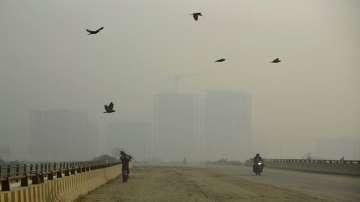The air quality deteriorated to reach "very poor" levels in Ghaziabad and Greater Noida, while it stayed in the "poor" category in Noida, Faridabad and Gurgaon in the National Capital Region (NCR) on Thursday, according to a government agency. Concentration of major air pollutants PM 2.5 and PM 10 remained high in the five immediate neighbours of Delhi, according to the air quality index (AQI) maintained by the Central Pollution Control Board (CPCB).
According to the index, an AQI between zero and 50 is considered 'good', 51 and 100 'satisfactory', 101 and 200 'moderate', 201 and 300 'poor', 301 and 400 'very poor', and 401 and 500 'severe'.
The average 24-hour AQI at 4 pm on Thursday was 305 in Ghaziabad, 207 in Noida, 315 in Greater Noida, 255 in Faridabad and 284 in Gurgaon, according to CPCB's Sameer app.
On Wednesday, it was 236 in Ghaziabad, 207 in Noida, 228 in Greater Noida, 172 in Faridabad and 141 in Gurgaon.
The average AQI on Tuesday was 166 in Ghaziabad, 172 in Faridabad, 178 in Noida, 186 in Greater Noida and 204 in Gurgaon.
On Monday it was 186 in Faridabad, 207 in Ghaziabad, 226 in Greater Noida, 243 in Noida and 246 in Gurgaon, showing drastic improvement over the previous day due to a spell of rain in the NCR.
On Sunday, the average AQI was 448 in Ghaziabad, 441 in Noida, 417 in Greater Noida, 425 in Gurgaon and 414 in Faridabad.
The CPCB states that an AQI in the "poor" category may cause breathing discomfort to most people on prolonged exposure, while "moderate" may cause breathing discomfort to people with asthma, lung and heart diseases.
The AQI for each city is based on the average value of all stations there. Noida, Faridabad, Ghaziabad have four stations each, while Gurgaon has three and Greater Noida two, according to the app.
Latest India News
